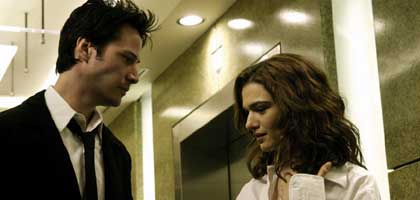
Constantine
Germany/USA/Australia 2005

Reviewed by Kim Newman
Synopsis
Our synopses give away the plot in full, including surprise twists.
The Spear of Destiny, imbued with Christ's blood, is discovered by a Mexican peasant, who develops super-strength and takes the artefact to the United States. In Los Angeles, John Constantine (Keanu Reeves) - born with an ability to see the 'half-breed' demons and angels among humanity - performs an exorcism and becomes convinced that a major incursion from Hell is brewing.
Isabel Dodson (Rachel Weisz), a mental patient who shares Constantine's gift, commits suicide, troubling her devoutly Catholic twin sister Angela (Rachel Weisz), a cop. Constantine is diagnosed with terminal lung cancer and appeals to Gabriel (Tilda Swinton), a half-breed angel, who confirms that he remains damned thanks to a teenage suicide attempt. Angela requests Constantine's help; he performs a ritual which sends him briefly to Hell, where he sees Isabel's suffering spirit. God and the Devil do not directly intervene in human affairs but maintain a balance, which seems about to be violated. Several of Constantine's associates are murdered by the demon Balthazar (Gavin Rossdale) and Angela is kidnapped by supernatural forces.
Constantine forces his way into a bar run by Midnite (Djimon Hounsou) - neutral in the war between God and the Devil - and discovers that Mammon, the Devil's rebel son, intends to impose a reign of terror on Earth. For this, Mammon needs a human vessel (Angela) and the Spear of Destiny (just delivered), but also divine intervention. Constantine defeats Balthazar, who is destroyed by his own co-conspirator: Gabriel, intent on delivering humanity to Mammon in order to bring out its best instincts through adversity. Constantine attempts suicide again, summoning Lucifer himself to fetch his soul. Wanting to maintain the balance, the Devil dispels Mammon and confronts Gabriel, whom God turns human as punishment. Lucifer lets Constantine live and cures his cancer, knowing his soul is still hellbound, but frees Isabel. Angela and Constantine vow to continue the good fight.
Review
The lengthy end credits of Constantine claim Kevin Brobdin and Frank Cappello's script is based on corporately owned characters ("from the DC Comics/Vertigo Hellblazer graphic novels") but do not feel obliged to list the writers and artists who created them and whose concepts are woven together here. Constantine, a British magician drawn by Rick Veitch and John Totleben to look like Sting in a trenchcoat (this was 1985!), was introduced when Alan Moore opted not to use the Phantom Stranger, DC Comics' established man of mystery, in a plotline running through his tenure on Swamp Thing. A crumpled, chain-smoking, cocky and cynical answer to Marvel's Doctor Strange, Constantine became the lead character in his own book, Hellblazer (debuting in 1988), initially written by Jamie Delano but later by Garth Ennis, Grant Morrison, Brian Azzarello and others. Moore, who delighted in putting Constantine in the same room as DC's staider occultists, was evoking standbys like Dr Occult, Zatara, Sargon the Sorcerer and the Phantom Stranger and filtering them through a hardboiled film noir approach, while later creators delved into the character's Liverpool-London roots, drawing on ideas from Michael Moorcock and Iain Sinclair as often as the pulpy demon-fighting of earlier magic-based comic heroes.
One odd effect of reworking the defiantly British Constantine as a Los Angeles-based American is that he now seems like an imitation of a hero conceived at least partially as an imitation of him: Clive Barker's magical private eye Harry D'Amour, played by Scott Bakula in the film Lord of Illusions. In a year when Bruce Wayne is Welsh (Pembroke-born Christian Bale assumes the role for Batman Begins), it's hardly a stretch to switch the national origins of a far less iconic comic-book character, but Keanu Reeves isn't comfortable in the role. Constantine is supposed to be a Man Who Sees Too Much, but Reeves has that bewildered, befuddled look familiar from the Matrix films, wandering through the plot explaining things to a genuinely puzzled Rachel Weisz, coughing enough to keep a terminal cancer subplot bubbling and briefly sending himself to Hell for scraps of plot-propelling information. If Reeves rarely seems comically out of place, he is consistently upstaged by flamboyant bit-players like Pruitt Taylor Vince, Max Baker and Djimon Hounsou as his underworld informants and only the weediness of Shia LaBeouf's performance as a tagalong cabbie ("my Tonto or Robin") prevents him from ceding screen space to his own sidekick.
Just as the comics process and reuse ideas from books and films, Constantine is a grab bag of bits from the whole demons-and-angels spectrum, relying especially heavily on the Christopher Walken Prophecy films (which even feature the same villain) and Wings of Desire while redoing Rosemary's Baby as an action picture and visiting a demon bar to reprise the devils-among-us subplots of Buffy and Angel. Pop video director Francis Lawrence concentrates on ominous gloom, setting scenes in odd locales like a mental hospital swimming pool and the arcana-packed backroom of a bowling alley, and working hard with CGI manifestations such as a man-shaped demon comprised of insects and vermin or, more simply, the unsettling eye-glints that give away the otherwise unnoticed hellfolk. As with the entire genre, much of the fun comes from the loopy theology and shuffling of occult macguffins, though giving the hero a mystical version of the Punisher's shotgun or having him douse a crowd of demons with holy water from the sprinkler system takes him a bit too close to the Blade films for comfort. More jaw-dropping is the revelation that the Bible as published in Hell has extra chapters, mostly because no one on screen laughs at the concept.
Mammon, the Devil's rebel son, is a disappointing and underused CGI 'ultimate threat', but the film eventually sidesteps Reeves in order to spotlight two genuinely amusing and weirdly inspirational representatives of Heaven and Hell: Tilda Swinton's sexless Gabriel and Peter Stormare's hands-on Lucifer. Swinton, with optional wings and a what-is-she-wearing set of surgical mummy bandages, is almost as creepy a Gabriel as Walken, switching from high-flown metaphysics to a blunt diagnosis of Constantine's spiritual dilemma ("you're fucked") and unsettlingly pleading that a plan to bring about Hell on Earth is for everybody's benefit. And Stormare, barefoot and with oily mud (cancer?) splashed around the ankles of his otherwise immaculate white suit, is a credible Devil, fed up with the status quo but irritated that anyone else should attempt a greater treachery than his. If there's a sequel, maybe Reeves should duck out permanently and let Swinton and Stormare carry the franchise.
Credits
- Director
- Francis Lawrence
- Producers
- Lauren Schuler Donner
- Benjamin Melniker
- Michael E. Uslan
- Erwin Stoff
- Lorenzo Di Bonaventura
- Akiva Goldsman
- Screenplay
- Kevin Brodbin
- Frank Capello
- Music
- Brian Tyler
- Klaus Badelt
